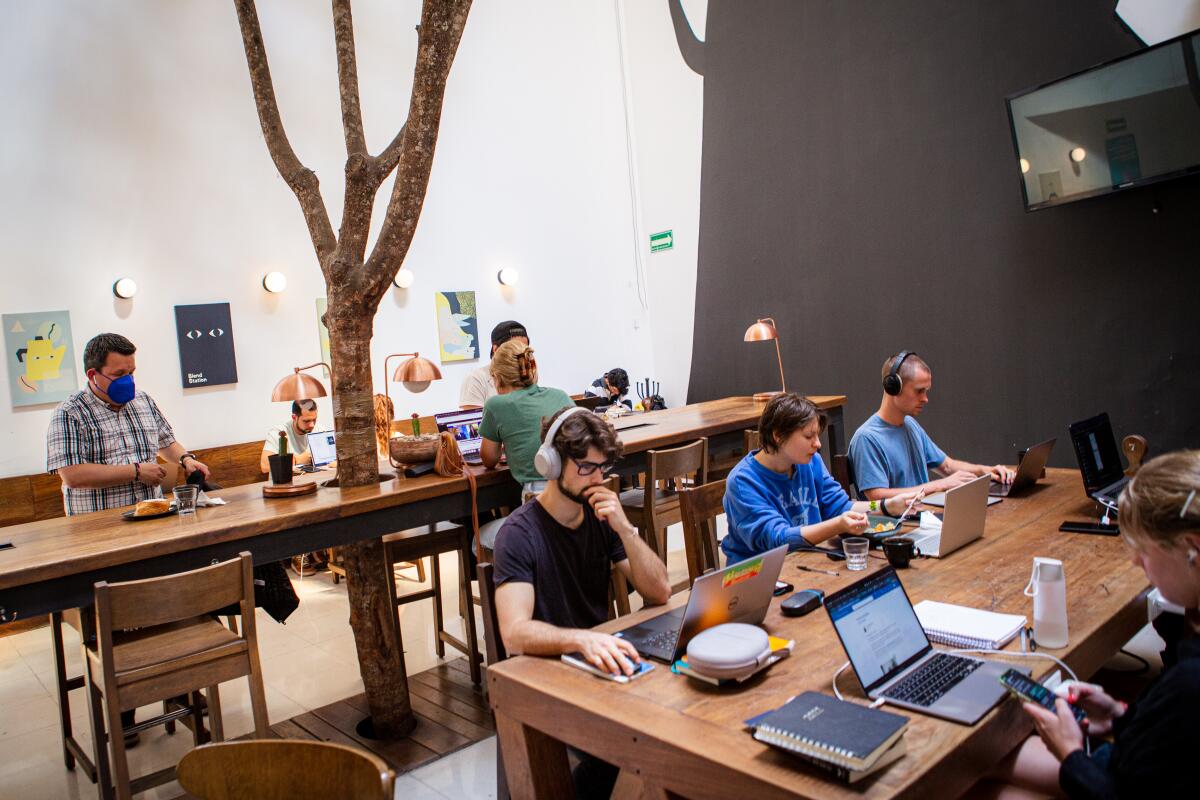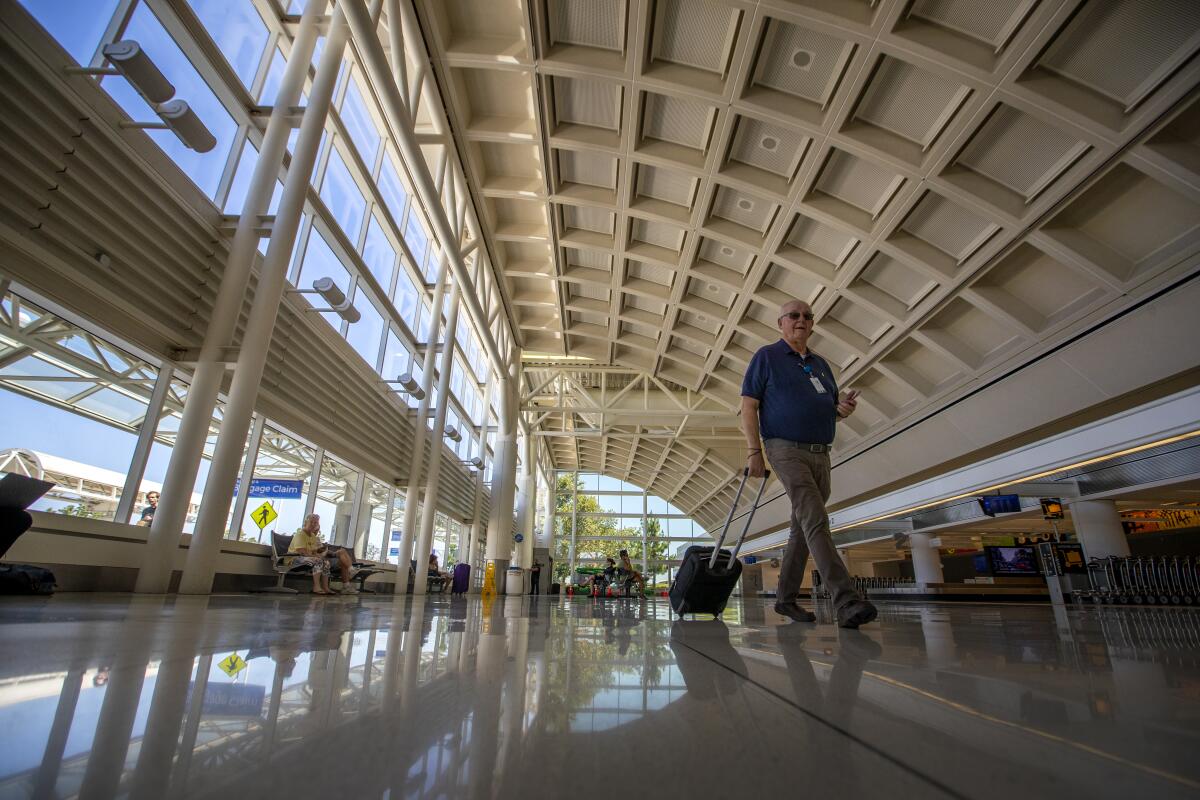What tops California? Some say Mexico City does

Good morning, and welcome to the Essential California newsletter. It’s Wednesday, July 27. I’m Gale Holland, a writer and assistant editor in The Times’ Metro section, writing from spectacular Echo Park.
Maybe it’s the tacos, spit-grilled in the street. Or the architecture — Art Deco, Art Nouveau, Modernist — so artfully stitched together.
It’s definitely the rents — the price of a one-bedroom apartment in Koreatown will get you a penthouse in some of the Mexican capital’s most graceful neighborhoods.
But an influx of tourists and digital nomads — many from California — is flooding Mexico City, triggering complaints of gentrification, touristification and displacement in the country’s cultural heart, Times Mexico correspondent Kate Linthicum writes.
The flood of American visitors began in earnest around 2016, when the New York Times named Mexico City the world’s top travel destination, Linthicum says. International artists, chefs and designers took over inexpensive studio spaces, integrating themselves into the city’s imaginative nightlife.
The pandemic pushed the rush into overdrive. As much of Europe and Asia shut their doors to Americans in 2020, Mexico, which adopted few COVID-19 restrictions, was one of the few places where gringos were welcome. Americans can stay six months without a visa.
But newcomers can be oblivious to how their presence affects locals — and insensitive to the fact that Mexicans cannot migrate to the U.S. with equal ease.
Americans, many of whom are white, reinforce the city’s own, pervasive — if infrequently discussed — color caste system.
“Americans can come here, and they can afford everything and live like kings and queens,” said Dan Defossey, an American who moved to Mexico a dozen years ago and owns a popular barbecue joint. Americans need to understand that “Mexico is not cheap for Mexicans.”
Mexico — which has a relatively small population of Afro-Mexicans and had a shorter history of slavery — can be a respite from racism for Americans of color.
“Being black in America” is exhausting, said Lauren Rodwell, a remote marketing tech worker who tired of San Francisco and came to Mexico City. “It’s nice to take a break from it,” Rodwell added.
Not everybody is unhappy with the American inundation. Ted Rossano Jr., whose parents two decades ago opened a taco stand in the Centro neighborhood, said income from foreigners had helped save the business, which suffered during the pandemic.
Ricos Tacos Toluca is a stop on several of the “taco tours” that have emerged in recent years, and he said foreigners now supplied about 15% of the stand’s revenue.
“It’s cool. We’re proud of it,” Rossano said. “Who would have thought that a simple business like this would get international recognition.”
Sign up for Essential California
The most important California stories and recommendations in your inbox every morning.
You may occasionally receive promotional content from the Los Angeles Times.
And now, here’s what’s happening across California:
Note: Some of the sites we link to may limit the number of stories you can access without subscribing.
L.A. STORIES
The other Ivana: Writer Ivana Lowell remembers the unlikely friendship she struck up at a Malibu drug rehab center with a woman who shared her name. Ivana Trump, who died July 14, was post-Donald when she entered “rehab,” where she stayed with a younger companion. She did not feel it necessary to attend group or 12-step meetings and celebrated the program’s end by treating her fellow rehabbers to a Champagne lunch, Lowell says. Ivana also shared stories of her abusive marriage and her hatred of her ex. (Despite her vitriol at the time, she and her ex-husband would remain amicable until her death last week.) Airmail
Britney lashes out: Britney Spears took to Instagram this week to call out her mother, Lynne Spears, for allegedly shunning her, lying to her and exploiting her while pretending to be a model parent during the pop musician’s 13-year conservatorship. In November, a Los Angeles judge finally terminated the conservatorship that had been in place since 2008. Los Angeles Times
Support our journalism
IMMIGRATION AND THE BORDER
Pregnant and languishing in a Tijuana refugee camp: Claudia, a 32-year-old Honduran who escaped an abusive partner only to languish in a Tijuana tent encampment, already had a name for her unborn child: Johan. She became pregnant on her long journey to seek U.S. asylum. But U.S. officials have greatly curtailed asylum seekers with policies they use to specifically target pregnant women: The Border Patrol “reserves MPP [the policy] as a reliable alternative for expelling pregnant females,” the agency wrote in a 2020 memo obtained by Human Rights First. Pregnant refugee women are an easy target for border gangs, which have kidnapped, beaten and shot them, advocates say — violence that, on more than one occasion, has triggered women to go into labor. Two months before Claudia’s due date, she had her last checkup at Tijuana’s sole clinic for pregnant refugees and then vanished, a two-year joint investigation by Capital and Main and Rolling Stone found. Capital and Main
POLITICS AND GOVERNMENT

Elon Musk drops Ontario traffic tunnel: But the San Bernardino County Transportation Authority pledges to soldier on, building two-way tunnels that can whisk riders from the Rancho Cucamonga Metrolink station to Ontario International Airport and back in less than 10 minutes, at a cost of $492 million. Musk’s civil engineering firm, the Boring Co., submitted the unsolicited tunnel proposal in 2019 but quietly backed out. Musk also dropped proposals for tunnels beneath Sepulveda Boulevard on the Westside and between a Metro station on Vermont Avenue and Dodger Stadium. His company unveiled its first high-speed tunnel in 2018, a 1.14-mile route beneath Hawthorne that took about 18 months and $10 million to construct. Los Angeles Times
CRIME AND COURTS
CARE Court — a “policy mirage”: The Times Editorial Board, which is separate from The Times’ newsroom, does not think much of Gov. Gavin Newsom’s proposal for a Community Assistance Recovery and Empowerment Court to help people struggling with debilitating mental illness and homelessness. Behind the “veneer of voluntariness,” the proposal embodies the same old forced care and criminalization of mental illness by leaders who will do “anything but make the necessary investment in housing, treatment and care,” the board says. Editorial writers did applaud Newsom’s “separate but related commitment” to fund thousands of affordable housing units. Los Angeles Times
Court may revive Uber driver suit: The California Supreme Court has agreed to consider reviving a state law giving workers who sue employers over labor law violations their day in court, even if the workers agreed to submit disputes to arbitration. In a lawsuit filed by an Uber driver, the U.S. Supreme Court had ruled that sidestepping arbitration violated the rights of employers, who frequently win favorable arbitration rulings. But a lawyer for the Uber driver said “on a California statute, dealing with California citizens and California employees, the California Supreme Court will have the last word.” Government Technology
HEALTH AND THE ENVIRONMENT
Beverly Hills balks at potential mask mandate: The Beverly Hills City Council voted against enforcing a mask mandate should Los Angeles County bring one back. At a vote Monday, Beverly Hills leaders also mentioned that officials were “researching the requirements for the city to form its own health department.” Los Angeles Times

Strawberry fields forever? Don’t count on it: California growers are eying agricultural robot pickers as perhaps the only way for an industry sitting on the intersecting fault lines of climate change, water rights, labor struggles, land use and chemical regulation to adapt and survive. Los Angeles Times
CALIFORNIA CULTURE
“Vacavilloceraptor”: A wild turkey was tagged with the nickname after attacking a resident near the Fairfield, Calif., airport. The angry bird then whaled on the vehicle of a police officer, who turned tail with the turkey trailing. The officer later offered tips on how to handle a wild turkey attack. “Stay in your vehicle; they haven’t figured out door handles yet,” the officer said. “Also, consider safely driving away. They can only run up to 25 mph.” The Press Democrat
Cinema Cafe: The mom-and-pop cafe in downtown Merced has been gone for three years, replaced by a combination eatery-bar-theater — a Hyatt Hotels venture. But the Cinema Cafe’s loss still haunts writer Anh Diep, who wonders which communities are lifted when developers arrive in a town like Merced with promises to make it a “real city.” Zócalo
“Must be nice” department: Brad Pitt, a notable architecture buff, has paid $40 million for a century-old home on a bluff in the Carmel Highlands, in one of the priciest real estate deals along California’s Central Coast. The property, known as the D.L. James House, was designed by Charles Sumner Greene, a prominent early 20th century architect known with his brother Henry Mather Greene for championing the American Arts and Crafts movement. Unlike the wooden esthetic of the Greenes’ homes in Pasadena, the Carmel Highlands house is built from locally quarried sandstone and granite, according to the Gamble House, a Pasadena organization dedicated to the brothers’ architectural legacy. The house has arched windows, a tiled Mediterranean-style roof and sweeping views of the ocean. Wall Street Journal
Tony Dow is in hospice. The “Leave It to Beaver” star is in hospice but still with us. Several media outlets erroneously reported his death because of an accidental Facebook posting by the management team for the beloved Wally Cleaver actor. Vulture
Free online games
Get our free daily crossword puzzle, sudoku, word search and arcade games in our game center at latimes.com/games.
CALIFORNIA ALMANAC
Los Angeles: sunny, 82 . San Diego: sunny, 75. San Francisco: partly sunny, 66. San Jose: partly sunny, 78. Fresno: sunny, 101. Sacramento: sunny, 95.
AND FINALLY
Today’s California memory comes from Ted Siler:
In late ’70s San Francisco, I lived with four others from Allentown, Pa., mid-Russian Hill, a palatial Victorian flat: 12-foot ceilings, crystal chandeliers, cut-glass doors, stained-glass windows, sea-life-tiled bathroom and kitchen, working gaslights, redwood walls, parquet floors. The back windows revealed a panorama — Angel Island, Sausalito, Mt. Tam, the circling Alcatraz light, whitecaps, regattas, oil tankers bellowing “Goodbye San Francisco,” accompanied by wind chimes and cable car bells. At the foot of the hill lay landlord Mr. Wong’s garden: lemons, Buddha, camellias, fuchsia, lilies, cacti, roses. All destroyed now: profit maximization.
If you have a memory or story about the Golden State, share it with us. (Please keep your story to 100 words.)
For the record: In yesterday’s newsletter, “City of Quartz” was referred to as a novel; Mike Davis’ acclaimed book is a work of nonfiction.
Please let us know what we can do to make this newsletter more useful to you. Send comments to essentialcalifornia@latimes.com.
Sign up for Essential California
The most important California stories and recommendations in your inbox every morning.
You may occasionally receive promotional content from the Los Angeles Times.




